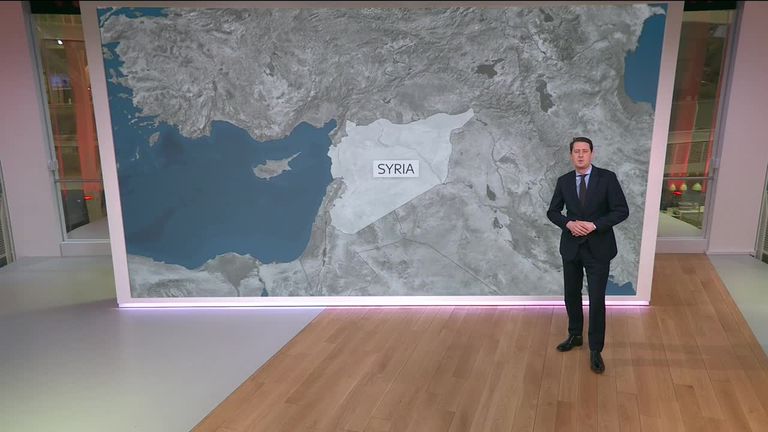Former UK ambassador: We must 'swallow our pride' on Syria
Lord Green says Britain won't have a sensible Syria strategy until it tackles its "instinctive rejection" of Bashar al Assad.
Thursday 19 April 2018 20:28, UK
A former UK ambassador to Syria has said we must "swallow our pride" and move towards re-establishing ties with Bashar al Assad.
Lord Green of Deddington, who was Britain's envoy in Damascus from 1991-94, told the House magazine the UK will not have a sensible strategy on Syria until it tackles its "instinctive rejection" of the Assad regime.
He said reopening Britain's embassy in the Syrian capital would be a "useful start".
Earlier this month, Britain joined the US and France in launching airstrikes on Syria's chemical weapons infrastructure.
:: Syria airstrikes: What did military action hit?
The military action was in response to a suspected chemical attack in Douma that is believed to have left dozens dead.
Prime Minister Theresa May stressed the strikes were about punishing Assad for the alleged chemical strike, rather than trying to achieve regime change.
Seven years on from the start of Syria's civil war, Assad's position appears more entrenched than ever.
Lord Green said Britain needed to accept the reality that the Syrian President is "here to stay" and "mere vituperation is not a strategy".
He said: "His forces have made decisive progress on the ground, strongly supported by Russia and Iran, both now key players in the region. Even the Israelis have long learnt to live with the Syrian regime.
"As for ourselves, we will not get a sensible strategy for Syria unless we come to terms with our instinctive rejection of the Assad regime. Certainly, it is a very tough police state and has been so for decades.
"Surveillance of any possible opposition by six secret police services is intense and their treatment of prisoners hardly bears thinking about.
"This is not due to Bashar al Assad alone - he is more a figurehead than a dictator.
"Rather it is the result of the seizure of power by a minority sect, the Alawites, who have held on to it for two generations with ferocious determination."
Lord Green called for pragmatism in British policy on Syria, chiefly the recognition that the greater threat was from groups like Islamic State.
"It is high time, therefore, to take an objective view of the Syrian regime and of our interests in the region," he said.
"Our major interest is the denial of Syrian territory to ISIS [another name for IS] and its allies. We need to be clear that Islamic extremists are the greatest threat to our own society since the Second World War.
"Friendship is hardly possible unless and until the Syrian regime lightens its touch but, meanwhile, we should swallow our pride and move in that direction."
Lord Green's call for dialogue was echoed by another peer who was speaking in the Lords earlier.
Former Navy chief Lord West said the Government had made a mistake in not dealing with Assad because "we hate and loathe" him.
"I'm afraid in the world of politics, in realpolitik, you have to deal with nasty bastards and we haven't done," he said.
Defence minister and deputy Lords leader Earl Howe rejected Lord West's call, saying Assad bore overwhelming responsibility for the Syrian people's plight and had caused "untold human suffering".







